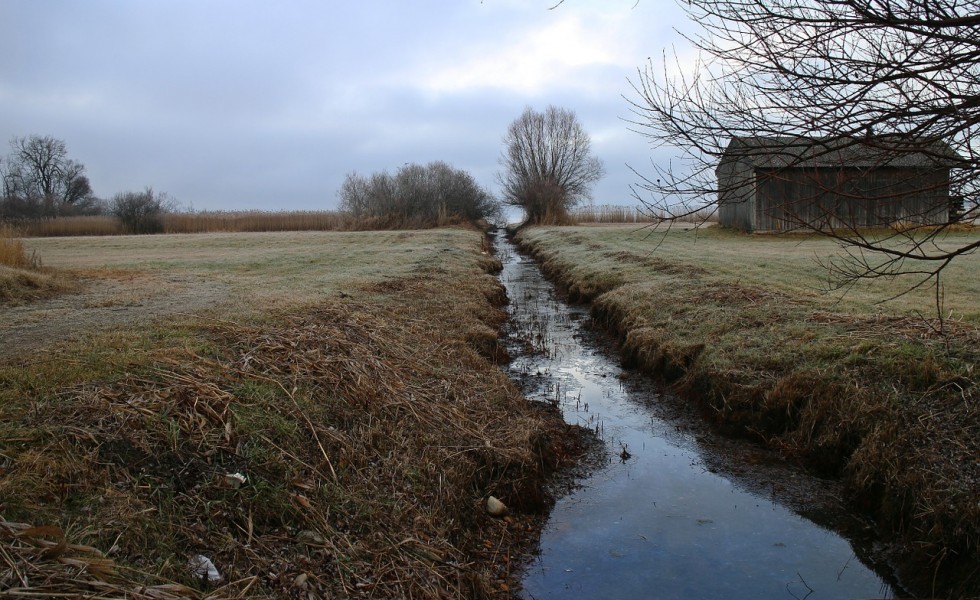Dirty Secrets, Dirty Water
Posted on March 9, 2016

It’s been a quick year since the Des Moines Water Works (DMWW) sued the boards of supervisors of three, ag-based Iowa counties over alleged violations of the Clean Water Act. It has not, however, been a quiet year.
The lawsuit against 10 drainage districts in Sac, Buena Vista, and Calhoun counties, explains the DMWW, is over “the discharge of nitrate pollutants into the Raccoon River,” the utility’s chief source of water, and the counties “failure to obtain a National Pollutant Discharge Elimination Permit in violation of the Clean Water Act.”
In the intervening year, claims the DMWW, the river water has gotten worse. On Jan. 4, DMWW reported it had spent $1.5 million to operate its nitrate removal equipment a record 177 days in 2015 so the water sold to its 500,000 customers would meet federal drinking water standards.
The other side of the fight has been equally active. Iowa’s farm-centered politicians continue to condemn the DMWW as over-wrought and its lawsuit as legal over-reach.
Last July, Iowa Gov. Terry Branstad again blasted the lawsuit and the DMWW (which delivers water to his Des Moines home). He suggested the utility “start working with others” rather than continue “to sue and attack other people.” In an October visit, former governor and current secretary of agriculture Tom Vilsack also encouraged cooperation and cautioned, “You do not want a federal judge deciding this….”
Jawboning aside, the lawsuit continues. In January, the federal judge mentioned by Vilsack, Mark Bennett, asked the Iowa Supreme Court to rule on several legal questions before, he said, he could proceed because of the suit’s importance to the state’s key industry and its legal “novelty.”
That novelty is, in fact, why most Iowa politicians and farmers alike are trembling at the very idea of the suit going forward. Here’s how Neil Hamilton, director of the Agriculture Law Center at Drake University in Des Moines, explained it in a lengthy, jargon-free blog post last March:
“The key legal claim is the [three Iowa counties’] drainage districts built, manage, and maintain the system of drainage ditches which artificially collect, convey and discharge polluted groundwater into Iowa’s rivers and streams imposing costs on the DMWW and others who use the water. This makes the districts’ point sources under the [Clean Water Act] … need permits to discharge….”
On Feb. 16, Hamilton, an ag law expert, explained to Kristina Johnson of the Food & Environmental Reporting Network (FERN) that if the suit’s key claim is proven—that underground farm tiles in “artificially created and maintained” drainage districts constitute traceable “source points” of alleged pollution—then long-exempt “normal farming activities” may fall under the Clean Water Act.
Moreover, in the long run, Hamilton suggested, it “isn’t necessarily important” whether DMWW wins or loses the suit because it “already has changed the discussion around water quality and agriculture…”
An eye-popping, Feb. 7 report titled “Fooling Ourselves” only adds to that evolving discussion.
Researched and written by Environmental Working Group, EWG, a Washington, D.C.-based environmental non-profit that most U.S. farmers love to hate, the report found that while USDA “has spent $3 billion in Iowa alone” since 2005 “on programs to help farmers farm in more environmentally friendly ways,” there’s little to none “conservation” benefit to show for all the dough.
In fact, EWG claims, “We are fooling ourselves by clinging to the hope that voluntary conservation measures will clean up Iowa’s water.”
In his FERN interview, lawyer Hamilton agreed. “There’s no question that Iowa has a water-quality issue, and that it’s getting worse.”
The dirtier water, however, is an indication of a dirtier secret we in agriculture would like to keep: yesterday’s rules cover an agriculture that no longer exists in either Iowa or the rest of the country. The rules covered traditional agriculture; today’s agriculture is industrial.
Therein lies the rub; more non-farmers than farmers—water customers in Des Moines and Akron, federal judges, members of Congress, your state legislators—are working to bring the old rules up to the public’s new needs.
© 2016 ag comm
Share This